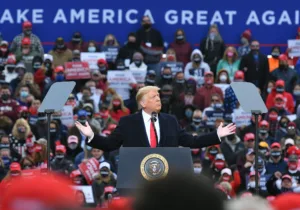On Monday, July 8, Secretary of State Mike Pompeo presided over a ceremony to announce the formation of a Commission on Unalienable Rights. The composition of the commission has been much discussed, and generally the mainstream press has complained about some members’ commitment to natural law thinking, while a smaller and often faith-based press has welcomed that same commitment.
I’d like to step back, take a look at some of Pompeo’s words in his announcement, and suggest the real story is not in the commission’s composition but its raison d’etre. “Every once in a while,” Pompeo said, “we need to step back and reflect seriously on where we are, where we’ve been, and whether we’re headed in the right direction.” So, the commission was formed to assess the United States’ direction. The secretary suggests we may have veered in the wrong direction. Direction, of course, implies a “toward something,” and that something is suggested by Pompeo later in his brief comments. He said, “International institutions designed and built to protect human rights have drifted from their original mission. As human rights claims have proliferated, some claims have come into tension with one another, provoking questions and clashes about which rights are entitled to gain respect. Nation-states and international institutions remain confused about their respective responsibilities concerning human rights.” The commission therefore directs itself toward the “original mission” of human rights, but the secretary doesn’t quite identify what the mission was. Instead, he moves to the sorting through of competing rights claims arising as a consequence of “proliferation.” The problem worth mentioning is that rights claims have grown to such a degree that they clash with each other, making their protection more difficult and causing domestic and international institutional confusion.
Pompeo amplified the concern in a Wall Street Journal op-ed published the Sunday prior. There he noted:
After the Cold War ended, many human-rights advocates turned their energy to new categories of rights. These rights often sound noble and just. But when politicians and bureaucrats create new rights, they blur the distinction between unalienable rights and ad hoc rights granted by governments. Unalienable rights are by nature universal. Not everything good, or everything granted by a government, can be a universal right. Loose talk of “rights” unmoors us from the principles of liberal democracy.
The proliferation of rights not only causes tensions between rights claims, it “blurs” distinctions between universal, God-given rights and ad hoc state-based rights, threatening to erode the very basis of our liberal democracy.
The proliferation problem is real and damages human rights’ efficacy. But if we suggest the main problem is the growth of rights that don’t seem like rights, we need to acknowledge as well how that problem relates to the capacity to stand for rights genuinely protective of human dignity. Put differently, there’s a surprising omission from Pompeo’s list of concerns that might provoke the creation of a panel of ethics experts whose task is to reflect on the “the big picture” of human rights that America lost sight of “in the hurly-burly of everyday affairs.” That, of course, is the United States’ post-9/11 relationship with fundamental rights, including the right not to be tortured. We can wonder whether the big issues US institutions of liberal democracy face is caused by the proliferation of rights or their struggles to uphold basic human rights in the context of an ongoing war on terror that continues to attenuate the line between the laws of war and criminal law.
So, if we just look at the issue just for a moment, we can see the value of forming a commission on human rights that might spend some significant part of its energies reflecting on the ways the war on terror has undermined our commitment to those rights. David Luban’s 2002 essay “The War on Terrorism and the End of Human Rights” retains its relevance. Neither a pacifist nor idealist, Luban understands the pressures wars of any sort place on human rights. He acknowledges as well—against those who simplify arguments against torture by claiming torture never works—the case of Abdul Hakim Murad, tortured for a month before revealing information about al-Qaeda plots to blow up 11 US planes and to crash another into the CIA headquarters. But nevertheless, he’s concerned that the post-9/11 context undermined human rights by creating dark spaces in the rule of law where dignity could be assaulted. Unlike more conventional wars, Luban argues, the war on terror embraces a “hybrid war-law model, which depresses human rights from their peacetime standard to the wartime standard, and indeed even further.” This means both that the depression of human rights is deeper than during the wartime standard, but also that the depression extends toward the infinite: a war on terror “has no natural resting point, no moment of victory or finality.” So long as the US prosecutes a war on terror and maintains a neither “here nor there” approach to domestic and international laws, it “means the end of human rights, at least for those near enough to be touched by the fire of battle,” Luban concludes.
As Pompeo’s “hurly-burly” comment suggests, human rights are not tested, maybe not even invoked, in day-to-day living. They operate on the vulnerable edges of life, often out of sight and mind, and do their work and meet their challenges in situations confused by the tensions of their contexts. There they, like the persons they intend to protect, stand with greatest vulnerability. In those places, they’ll undergo assaults on their meaning, their application, their possible conditionalities. The evidence, according to Luban, is that certain rights for certain people will collapse under the weight of the war on terror’s pressure. Is it possible that the erosion of these rights itself contributes to the proliferation problem?
The United States has not been the only country challenged by the post-9/11 context and the ongoing war on terror. Other states have contributed to the pressures on the international commitment to human rights. Institutions have in some cases buckled beneath that pressure and in others resisted and held strong. These institutions were designed, as the secretary said, to protect human rights. According to Secretary Pompeo, the “Commission on Unalienable Rights will ground our understanding of human rights in a manner that will both inform and better protect essential freedoms—and underscore how central these ideas are not only to Americans, but to all of humanity.” If an assessment of and recommitment to human rights protections is the mandate of the commission, I humbly suggest to them that they study the current status of the most basic rights and lessons to be drawn from the post-9/11 context. For it’s quite possible the problem of rights proliferation is caused not only by rights’ ostensible detachment from natural law foundations, but by the apparent ease with which even the most basic rights prove “alienable.”







 Live in the DC area? Sign-up for Providence's in-person events list!
Live in the DC area? Sign-up for Providence's in-person events list!